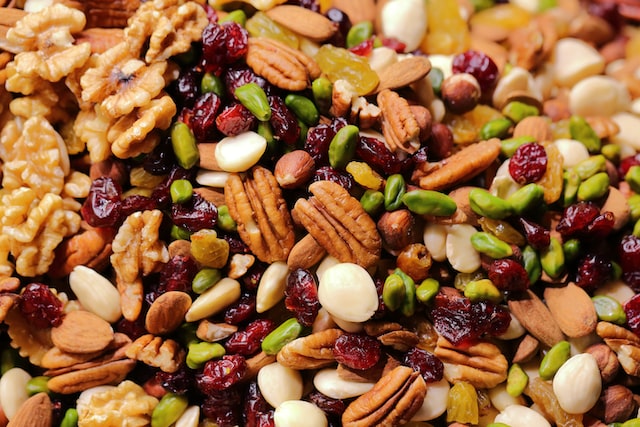Lymphedema is an abnormal fluid buildup that typically occurs in the soft tissues of the arms and legs. You can experience the symptoms of lymphedema for various reasons, but it most commonly results from the removal of your lymph nodes. You can also experience lymphedema if your lymph nodes experience damage from surgery, cancer or cancer treatment.
While lymphedema is often the result of uncontrollable factors, you can make specific dietary choices to help reduce your symptoms and improve your comfort levels.
9 Best Foods to Eat With Lymphedema
Lymphoid tissue plays a part in digestion, making it essential to create a clean diet that encourages a healthy and functional lymphatic system. Some ways you can improve your lymphatic system is by adding the following foods to your diet:
1. Water
Drinking enough water throughout the day helps keep your body’s lymph fluid hydrated and flowing smoothly.
2. Cranberries
Fresh cranberry fruits and juices offer various health benefits and contain valuable antioxidants that fight inflammation.
3. Leafy Greens
Dark greens like spinach and broccoli contain a high amount of chlorophyll, which benefits the blood and lymph fluid.
4. Nuts and Seeds
Olive oils and chia seeds contain essential fatty acids to strengthen vascular tissue and aid in absorbing fat-soluble vitamins and minerals.
5. Garlic
Eating garlic improves the function of your immune system and aids in clearing toxins from your body.
6. Ginger
Ginger is beneficial for digestion and circulation, which helps improve your lymphatic system.
7. Turmeric
Like ginger, turmeric benefits digestion and circulation by reducing inflammation.
8. Seaweed
Sea vegetables have many nutrients and aid in detoxing the body and eliminating excess fluid that builds in the tissues to slow the lymphatic system.
9. Citrus
Oranges, lemons and limes offer potent antioxidants and enzymes to help clean and protect the lymphatic system.
Foods to Avoid to Improve Lymphedema Symptoms
While some foods will help alleviate the symptoms of lymphedema, others may worsen your symptoms. You cdiet to y not eating foods such as:
1. Foods High in Sodium
While salt is essential to a healthy diet, eating too many high-sodium foods, such as cold cuts and processed foods, can cause you to retain a high amount of fluids and experience symptoms like swelling. Instead of cutting salt entirely out of your diet, you can gradually reduce your intake until you reach your recommended daily amount.
2. Foods With Added Sugars
Consuming excessive amounts of sugar can create insulin resistance, which causes glucose levels to remain high for long periods and result in tissue damage. If you have sugar cravings, it’s best to satisfy them with fruit.
3. Low-Protein Foods
Low-protein diets can be damaging to the health of your lymphatic system. Eating enough protein from foods such as eggs, fish, tofu, poultry and nuts is critical to prevent malnutrition and muscle wasting.
4. Red Meat
A diet rich in red meat can cause disruptions to your microbiomes and lead to decreased immunity and a higher risk of inflammation. Beef, veal, pork and lamb fall into the category of red meat.
5. Caffeine and Alcohol
You can consume coffee and caffeinated drinks in moderation, but excessive amounts can dehydrate your body and cause it to swell. If you can cut out caffeine partially, you can enjoy the recommended daily amount to get your energy fix without going overboard.
Consuming alcohol can remove fluids from your body, dilate your lymphatic tissue and create swelling, which may cause your condition to worsen.
6. Processed Foods
Eating large amounts of processed foods can hinder your immune and lymphatic systems, worsening your lymphedema symptoms. Some examples of processed foods to avoid include cereals, bacon and condiments like ketchup or barbecue sauce.
7. Trans Fats
Trans-unsaturated fatty acids or trans fats are partially hydrogenated fats that remain solid at room temperature and are unlikely to spoil. When trans fats break down and absorb into the body, they raise endotoxin levels in the blood, which can cause excessive swelling.To reduce symptoms of lymphedema, avoid foods made with trans fats, such as fried foods and take-out
8. Limited Amount of Fluids
Water is one of the best ways to improve symptoms of lymphedema, and not drinking enough can make it difficult for your body to maintain a fluid and chemical balance. Drinking the recommended amount of water will keep your body’s lymph fluid flowing correctly and prevent swelling.
Importance of Maintaining a Healthy Body Weight
Maintaining a healthy body weight can also help reduce the symptoms of lymphedema. By monitoring your daily calorie intake and being mindful of portion sizes, you can experience significant results in managing your symptoms.
Improve Your Diet to Improve Lymphedema Symptoms
Lymphedema treatment aims to reduce the amount of stress on the lymphatic system. You can improve your lymphedema symptoms by choosing specific foods to create a balanced diet.

